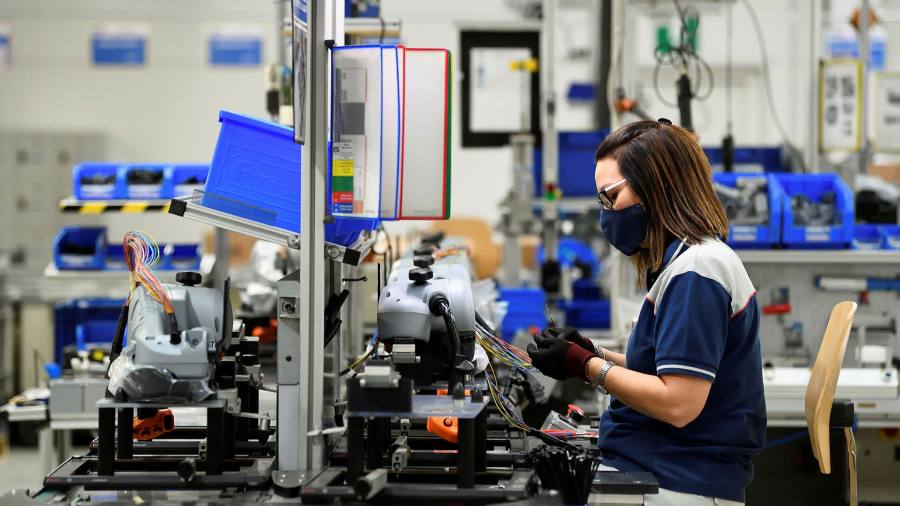[ad_1]
Factories in Italy and Spain are ramping up production to meet rising demand but also face growing shortages of raw materials and rising input costs, according to a closely watched survey of European businesses.
The purchasing managers’ indices published by IHS Markit on Monday were the latest illustration of Europe’s two-speed economic recovery, as the manufacturing sector drives growth while services businesses are still burdened with regulations and lockdowns to curb the spread of the coronavirus pandemic.
The manufacturing PMI for Italy, the eurozone’s second-largest manufacturer after Germany, rose to a three-year high of 56.9 in February, up from 55.1 in the previous month, the data showed. Spain’s manufacturing PMI rose faster than most economists had expected to a seven-month high of 52.9, up from 49.3.
A reading above the 50 mark indicates that a majority of businesses reported an expansion of activity.Â
Manufacturing’s positive performance was also illustrated by upward revisions to the German and French PMIs, lifting them to their highest levels since January 2018.Â
The pan-eurozone manufacturing PMI hit a three-year high of 57.9, up from 54.8 in the previous month.
This is a level “that has rarely been exceeded in more than two decades of survey historyâ€, said Chris Williamson, chief business economist at IHS Markit.
“Producers are benefiting from resurgent demand for goods in both domestic and export markets, linked to post-Covid recovery hopes driving renewed stock building and investment in business equipment and machinery, as well as improved consumption,†he said.
New export orders at Italian factories increased for the third straight month in February and at the fastest pace since December 2017. Domestic demand also rose; businesses surveyed attributed the improvement to looser Covid-19 restrictions, which helped release pent-up demand.
The increase in activity added to pressure on supply chains. Suppliers’ delivery times lengthened to the greatest extent since the height of the pandemic last April. Many Spanish manufacturers reported “supply-side shortages, with strengthened global demand and ongoing transportation delays pushing up delivery timesâ€, IHS Markit said.
Input prices rose at the fastest pace since 2011 as a result of the shortages and factories in Spain raised their prices at the fastest rate since June 2018.
Spanish factories said their backlogs of work increased for the first time in nearly two years.
Despite the supply chain problems, confidence about the coming months rose among both Italian and Spanish manufacturers as they anticipated that a further loosening of pandemic-related activity restrictions could boost demand further.
The data “confirms the continued resilience of manufacturing activity across Europe, consistent with little-to-no restrictions being placed on industrial activity as part of the ongoing restrictions aimed at containing Covid-19 infectionsâ€, said Nikola Dacic, an economist at Goldman Sachs.Â
[ad_2]
Source link






